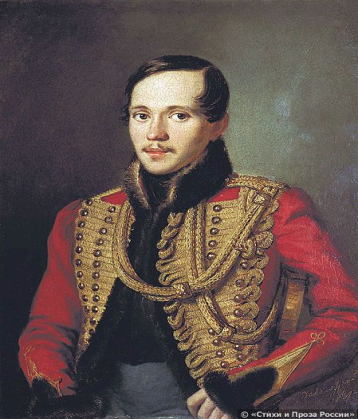Конспект урока «Творчество М.Ю. Лермонтова» по английскому языку для 11 класса
Разработка открытого урока по английскому языку по теме
« Творчество М.Ю. Лермонтова» в 10-11 классах.

Разработан Бобровой О.Л. учителем английского языка МБОУ СОШ №2 г. Конаково Тверской области.
Цель: Познакомить обучающихся с интересными фактами в биографии писателя и его творчеством на английском языке.
Тренируемые УУД: 1. Коммуникативные
- планирование учебного сотрудничества с учителем и сверстниками;
- умение с достаточной точностью выражать свои мысли;
2. Личностные
- мотивация к изучению английского языка;
- заинтересованность к дальнейшему, более детальному изучению творчества писателя.
3. Регулятивные
- целеполагание;
- планирование (умение планировать учебную деятельность на основе ментальной карты урока);
- прогнозирование;
- контроль понимания аудитивного текста.
4. Познавательные
- развивать навыки аудирования;
--умение вычленять основную информацию на основе услышанного;
- тренировать грамматические навыки (употребление дат, годов и сослагательного наклонения).
Ход урока.
1.Приветствие учителя, рапорт дежурного.
Вводное слово учителя и планирование учебной деятельности, постановка целей и задач.
Before we’re going to start our lesson tell me, please, what the 15th of October is associated with? (планируемый ответ- the 15th of October is associated with the birth of M. U. Lermontov). You’re absolutely : Why did I live? Why was I born? Whose words are they? (предполагаемый ответ- These are the words of Pechorin- a famous character of Lermontov).
To be successful we should do the following:
(дети читают план урока)
- how to pronounce the dates & years;
- some grammar(if-clauses);
-be attentive while listening & be ready to answer the questions of the test;
- be active;
-remember some works of Lermontov & try to recite them.
Речевая зарядка. Повторение некоторых знаменательных дат из жизни и творчества писателя. ( На экране основные даты: the 15th(3rd) of October 1814, 27 . 07. 1841, 1817 , 1825, 1827–1829 , 1841, 15(27) of July, 1837…)
2. Now to travel through the history we’ll remember some grammar. I would like somebody to explain grammar material, to be exact, if-conditionals. (Один ученик у доски напоминает правила употребления сослагательного наклонения, уделяя особое внимание на так называемые условные предложения 2 типа- if+S+V2/ed, S would V1)
Let’s practice these sentences: If I lived in the 19-th century, I would…(дети дают различные варианты окончания предложений. Когда прозвучит вариант: If I lived in the 19-th century, I would meet Lermontov переходим к основной части урока- знакомство с некоторыми фактами детства писателя.
3. Выходит ученик в образе М.Ю. Лермонтова.
1.Good morning, friends! Do you recognize me? I’m Michael Lermontov. It’s a great pleasure to be here. I’ve come to tell you some interesting facts from my childhood, about my roots & what factors influenced my writing career. (На фоне презентации ученик рассказывает о раннем детстве писателя).
2 I was born on the third of October 1814 in Moscow. This is a portrait of me when I was small.
3 This is my house in Tarkhany near Pyatigorsk where we moved with my grandmother.
4 In this room we often had guests.
5 This is my mum, Marja Mickhailovna Arsenjeva. I remember, when she was playing the piano or singing, I was crying. She died when I was only three years old.
6 My dad Juri Petrovich Lermontov. He was a retired infantry captain. After the death of my mother he agreed that I had to grow up with my grandmum. He was kind but irascible.
7 My grandmother, Elizaveta Alexeevna Arsenieva. She was a member of a wealthy family. My upbringing involved herself totally. She had spend much time and money for my education, she herself was a great teacher.
8 My granny loved me so much and bought me a deer and a calf. I had been playing with them from morning till night, but when they grew up, they became dangerous and we let them free to the forest.
9 Later she ordered for me a perfect present, a Circassian horse from Moscow.
10 During the winter time in my house lived other peasant children and we played in the snow making snowcastles and different figures of animals. I must say, I was very good at it.
11 Once I was given coloured wax, and I reconstructed battles of Alexander Macedonian and his army, but my granny didn’t like war topic, and she asked me to make a hunting scene.
12 That was my answer for her. The figures disappeared and I hope someone saved them.
13Since my childhood I composed rhymes and verses
14 that were almost my first words. Guests said that they had to write down what I was saying, but no one had ever done it, an today no one remembers what I have really said. Maybe I have composed better than these verses.
15 The study where I liked to work
16 When I was born, the doctor said that I would not die a natural death- and you know that this will be truth.
17 my first poem was «Autumn” 1828
18 My first published poem was "Spring"-1830
19 I’m proud to say that I learned mainly by means of self-education, and a fine library in Tarkhany, mastered several European languages (French, German and English writers I read in the original), and also had deep knowledge of European culture.
20 Now I’d like to be sure that you’ve understood my story. Answer my questions, please. (Идёт проверка услышанного в форме вопросов). let’s answer my questions
-
Where was I born?
-
Where did I get education?
-
Was my dad a military man?
-
What is the name of my first written poem?
-
What is the name of my first published poem?
-
What languages did I master?
It would be very pleasant for me to know if you can recite any of my poems.
21 What questions would you like to ask me
If you have any questions to me, I would be glad to answer them.
.22. It would be very pleasant for me to know if you can recite any of my poems. (Дети декламируют произведения Лермонтова на русском и английском языках).
5. Физкульминутка.
23.Now it’s time to relax. In my times young people liked dancing very much. Do you like dancing? I’d like to teach you some movements of popular dances of my youth. (идет объяснение некоторых движений танца…, затем несколько пар демонстрируют танцевальные «па» под музыку). It was great to spend some time with you, friends, but I must be off now. Hope you got some experience from our conversation. Best wishes in your studies. Buy.
6. Рефлексия урока. What new information have you got from our lesson? What was interesting or exciting? What did you like or didn’t?
7. Summering up. (выставление оценок, подведение итогов и результатов урока).
Здесь представлен конспект к уроку на тему «Творчество М.Ю. Лермонтова», который Вы можете бесплатно скачать на нашем сайте. Предмет конспекта: Английский язык (11 класс). Также здесь Вы можете найти дополнительные учебные материалы и презентации по данной теме, используя которые, Вы сможете еще больше заинтересовать аудиторию и преподнести еще больше полезной информации.

